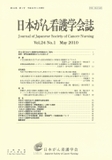Japanese
English
- 販売していません
- Abstract 文献概要
- 参考文献 Reference
要旨
本研究は外来で化学療法を受けるがん患者のセルフケア行動と自己効力感の関連を明らかにすることを目的とした.A県内2病院で病名および化学療法に関する説明を受け,外来化学療法を受けているがん患者56名(平均年齢62.1±13.4歳)を対象に自記式質問紙調査を行った.消化器系および乳腺がん患者が全体の8割を占めた.セルフケア行動得点は142.9±14.8(最小—最大:101—170)で先行研究より高く,クラスターおよび判別分析による「全体的高得点群」が対象者の約半数を占めていた.セルフケア行動と関連がみられた個人変数は3変数で,性別,化学療法間隔,相談者(医師)であった.すなわち,女性は男性と比べて,化学療法間隔の長い者は短い者と比べてセルフケア行動得点が有意に高かった(p<.05).また相談者が医師である者はそうでない者と比べてセルフケア行動得点が有意に高かった(p<.01).自己効力感得点は27.6±4.2(最小—最大:20—39)でがん患者を対象とした先行研究よりも低かった.セルフケア行動と自己効力感(全体),日常生活行動の効力感,感情統制の効力感ともに有意な相関はみられなかった.
外来化学療法患者は副作用予防の重要性を十分に認識せざるをえない状況であり,侵襲の強い化学療法の影響を受け自己効力感が低いなかでもセルフケア行動を行っていることが明らかになった.看護師は外来化学療法患者の背景やセルフケアによる負担感を考慮し,ケアしていく必要性が示唆された.
Abstract
The objective of the present study was to elucidate the relationship between self-care behavior and self-efficacy of cancer patients undergoing outpatient chemotherapy. A self-report questionnaire survey was conducted on a total of 56 cancer patients undergoing outpatient chemotherapy who were given explanations on their disease condition and chemotherapy at one of two hospitals in Prefecture A. Patients had a mean age of 62.1 ± 13.4 years, and 80% of them had digestive system cancer or breast cancer. The mean score for self-care behavior was 142.9 ± 14.8(range, 101-170), which was higher compared to previous studies, and approximately half of the patients were in the "overall high score group" based on cluster and discriminant analysis. Self-care behavior was related to personal variables of gender, duration of intervals between chemotherapy cycles, and source of guidance(doctor). Specifically, scores for self-care behavior were significantly higher for women compared to men(p<.05), patients with a long interval between chemotherapy cycles compared to those with a short interval(p<.05), and for patients who consult doctors compared to those who consult other sources(p<.01). The mean score for self-efficacy was 27.6 ± 4.2(range, 20-39), which was lower compared to previous studies for cancer patients. No significant correlations were observed between self-care behavior and overall self-efficacy as well as the efficacy of daily living activities and emotional control.
These findings indicate that patients undergoing outpatient chemotherapy were sufficiently aware of the importance of preventing side effects during chemotherapy which is highly aggressive, and that they engaged in self-care behavior despite having a low self-efficacy. Nurses must provide care by considering the background of patients undergoing outpatient chemotherapy as well as the burden of self-care.
Copyright © 2010, Japanese Society of Cancer Nursing All rights reserved.


